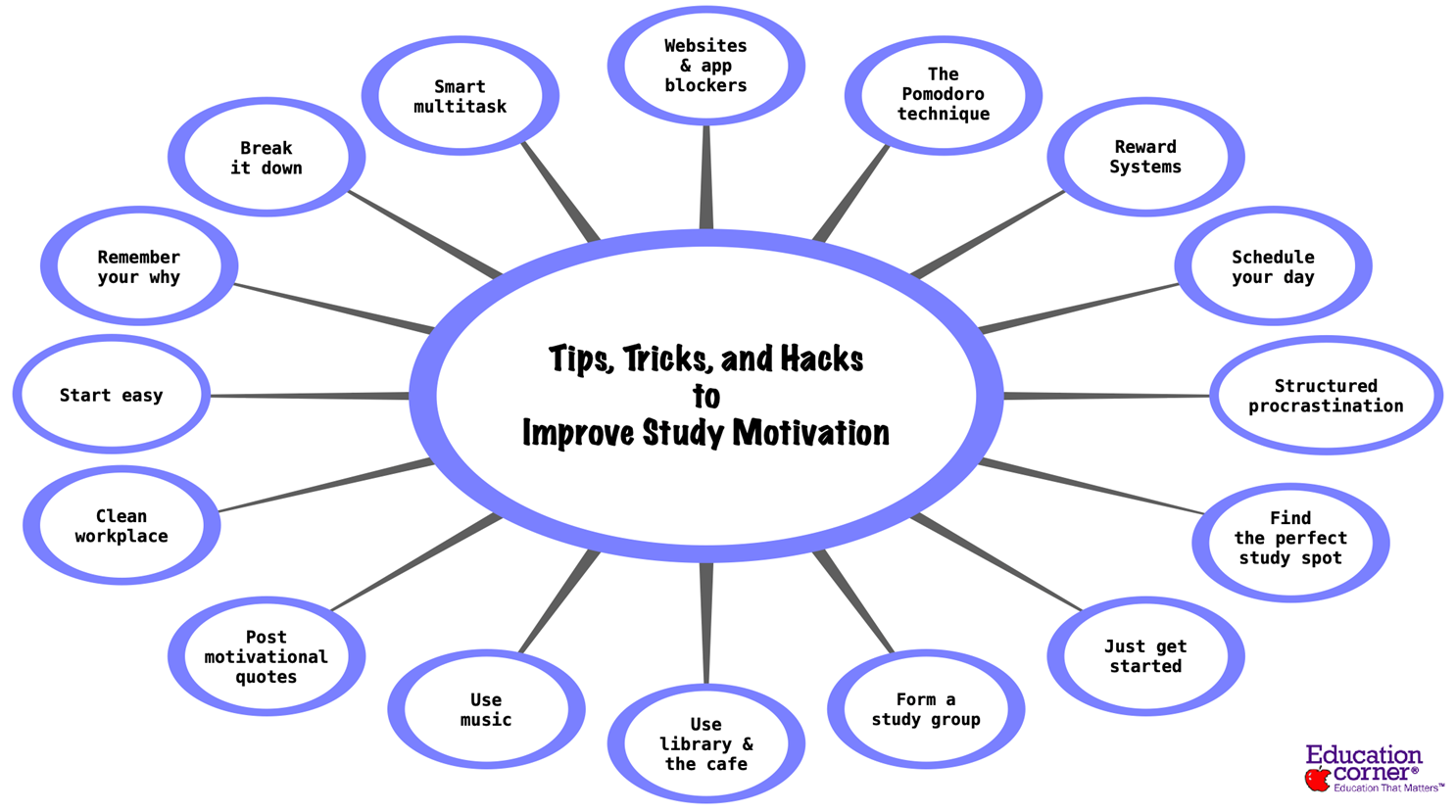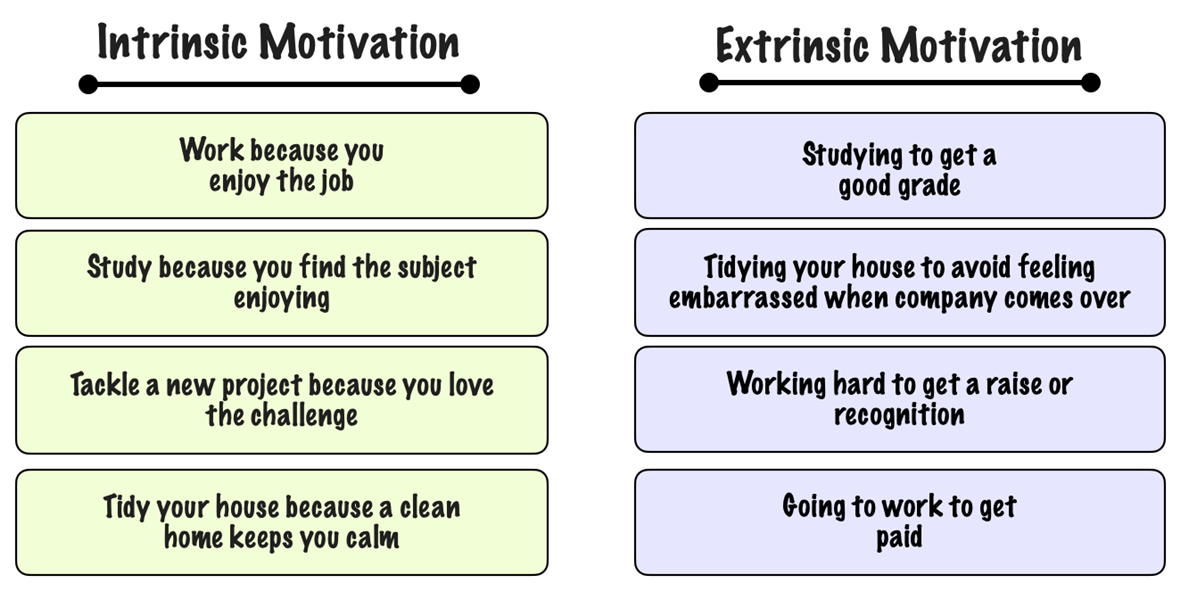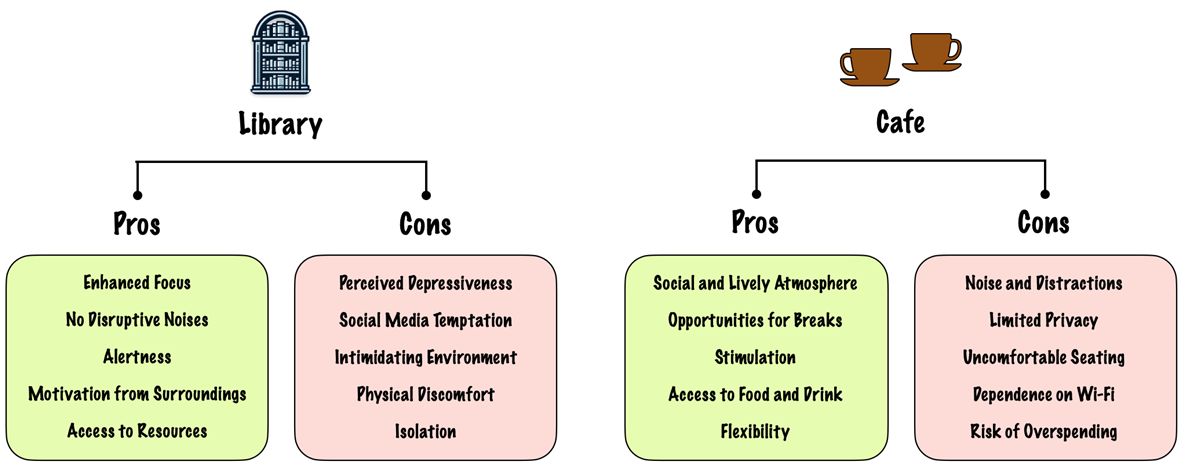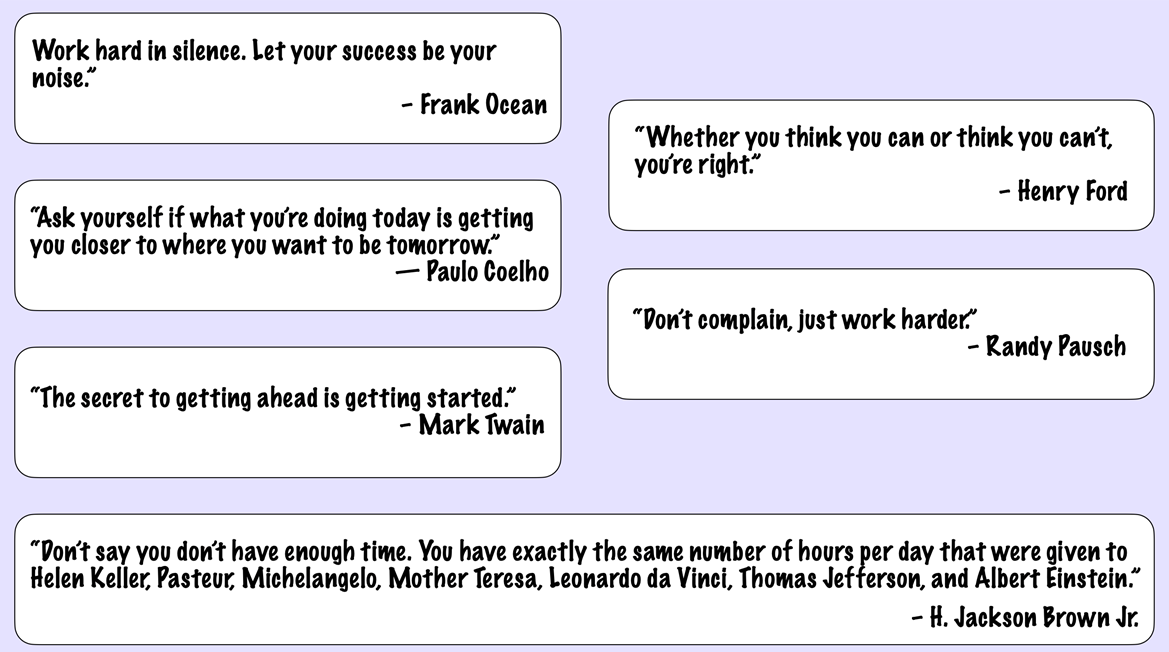Study for two minutes. Check Instagram. Study for two minutes. Browse Netflix. Study for two minutes. Check email. Study for two minutes. Get lost in TikTok indefinitely.
If this sounds like your typical study session, you’re certainly not alone. You need a little help to kick your motivation into high gear, especially if you have a test coming up.
Maybe coming here is your next form of procrastination. If so, at least you’re on the right page. If nothing else, it’s a good distraction from studying, and you might find something useful to up your study game.
Not every study motivation strategy works for everyone, but there’s something out there that will work for you. We’ve compiled a list of study motivation ideas to try when you need to buckle down and get it done.
Browse our ideas below and try out a few of them. Some will work well in isolation, others work well when combined, and some may work for you today but not tomorrow.

1. Website and app blockers
The internet can be a great tool to help you with your studies, but distractions, too, are always a click away. You could say this is a matter of discipline, but sadly, the odds aren’t in your favor.
Some of the greatest minds of our generation work around the clock to “increase engagement,” which means getting you to spend every waking moment scrolling and liking things. This is where distraction-blocking software comes into the picture.
These are “classic” study motivation tools because they work by literally taking away what is distracting you (assuming your distraction is digital). So, these are a great option if you need just a little help with your self-control.
There are quite a few blockers available for your phone and your computer. Some popular ones include Freedom, Cold Turkey Blocker, LeechBlock NG, RescueTime, SelfControl, AppBlock, and PawBlock.
They all work similarly: they block whatever websites/apps you want them to block for the time you specify. But make sure you choose a website blocker that you cannot bypass.
This is an ideal option for you if you sound like the person described at the beginning of this article. So, take a minute to think about what websites or apps tend to suck up most of your time and block them while you study.
If this sounds insanely difficult, begin with short blocks of time and work your way up.
2. The Pomodoro technique
At its core, the Pomodoro Technique is very simple: Study for 25 minutes, take a break for 5-10 minutes, repeat the cycle four times, take a longer break, and repeat again:

The technique effectively improves productivity due to its structured approach that combines focused work intervals with regular breaks.
There are different variations of this technique. Sometimes, shorter study intervals or repeating the cycle three times may work best before taking a longer break. You can always customize what works best for you.
Knowing the end is in sight and a break is coming up makes studying for longer periods of time easier.
To help you keep track of time and avoid constantly checking the clock, set a timer for both your study sessions and your breaks. You can also use online Pomodoro time trackers that automatically remind you about the intervals.
Make the most of your breaks by getting up and engaging in a physical activity, such as a walk or stretch, that gets your blood pumping. If you use your breaks to watch 10 minutes of a TV show, you probably won’t be very motivated to jump back in.
The Pomodoro Technique also works well with website and app blockers. Some blockers, such as FocusMe and Session, make using this technique simple and offer a Pomodoro timer as an embedded feature.
3. Create your own reward system
According to psychology theory, some people are motivated to do things because of their internal desires and wishes, while others are motivated by external rewards (also known as incentive theory):

So, if you belong to the latter, external rewards are a good way to keep yourself motivated.
You could, for instance, link something that you really want – a box of cookies, a break to go for a run, a trip to the movies, etc. as a reward for completing a study session. Maybe you buy some cookies and allow yourself to eat them only when you’ve studied for an hour.
Rewards can be designed with varying depths.
For example, you could see a new movie once you’ve studied for three hours or mastered 20 terms. Or you pick up some candy and pop one in your mouth whenever you get a correct answer. You could also make your favorite snack but eat only when studying.
Creating shorter reward intervals (like candy) works best when you struggle with focus. Once you get in the groove or find more motivation, you can work up to more delayed gratification.
To maintain pressure and encourage yourself to do well, try creating a reward you can only receive if you do well in the exam or the course.
Have your parents participate—it can be very helpful. For instance, if you get an A, maybe your parents can take you to your favorite restaurant or an amusement park if you get a B.
To be effective, a reward system must be practical and customized to your needs.
There is no point in setting up a reward for an A grade when you know an A is next to impossible. Similarly, don’t reward yourself with a trip to the mall if you don’t like shopping or spending money leads to stress.
4. Schedule your day
In high school, I was more motivated to study during the days when I had a practice or a game scheduled, but on days with no plans, I was easily tempted to procrastinate.
Often, the more free time you have, the easier it is to waste it. But when you have a lot going on and know you won’t have much time to study, it forces you to become laser-focused.
Research indicates that effective time management is crucial to academic success and reduces anxiety levels among students. The approach helps prioritize essential tasks, manage deadlines effectively, and dedicate focused time to each activity, leading to improved academic performance.
By creating a structured schedule, students are less likely to put off tasks because once on the calendar, they are easy to visualize. The work becomes more concrete, and what must be completed becomes clear.
5. Structured procrastination
Yes, you read that right—you can use procrastination to your advantage.
Discovered by Stanford University professor John Perry, structured procrastination is an amazing strategy that converts procrastinators into effective people who are respected and admired for what they can accomplish and the good use they make of time.
The key idea is that procrastination doesn’t mean doing nothing. Procrastinators often do small tasks to avoid the more important ones. However, if the important task were to become a way of avoiding something even more important, the procrastinator would gladly do it.

For structured procrastination to work, think of tasks that you see as more important or difficult than studying and put them at the top of your to-do list. Your procrastinating mind will automatically tell you to avoid them and get busy with studying instead!
6. Find the perfect study spot
In college, I often studied in a comfy chair in the lobby of an infrequently used building. I was comfortable, distractions were minimal, and the place encouraged me to get my work done.
In high school, I loved to study outside in our backyard. I liked getting some fresh air after being stuck in school all day.
Finding the perfect spot to study can sometimes be the key to effective studying. A good study spot improves concentration, productivity, and learning outcomes.
So, choose a spot you absolutely love. It could be your favorite chair or lying outside in a hammock. Or you could create a cozy space in the corner of your bedroom.
Wherever it is, make it your designated study space and use it only for studying. The more you love to be there, the better; you’ll be motivated to study because you will love to go to your favorite spot!
7. Just get started
Oftentimes, starting a task is more difficult than the task itself. Once you sit down and start, you will likely get into the groove.
So, make no excuses. Just sit down and start studying. If you think this tip might work for you, then study.
Literally, right now, stop reading this article and study!
8. Form a study group
If you’re a social person, studying can be difficult because of solitary silence. Having a study group can motivate you.
Your study group could even consist of your parents or a friend who isn’t in the same class. When you go stir-crazy from being quiet and alone, they can help quiz you or keep you company.
You could also get your teacher or professor involved in this one. They want to help you and are unlikely to say no if you ask. Check with them if you and a few friends can come in early, stay late, or hang out during a study hall period to study.
Being in the presence of your teacher will motivate you to study, with the added bonus of having an expert in the room. If you’re putting off studying because the material is confusing and overwhelming, this strategy is bound to help.
As a teacher, I never turned down students who asked for extra help or wanted to study in my classroom. When students would form study groups in my classroom, I was right there to answer any questions and make their study session more productive. I also often gave extra tips or explanations I didn’t give during class.
9. Go to the library or a Café
When you sit down to study and find yourself checking social media, it’s easy to become envious of everyone having a good time. It’s also easy to start thinking you’re the only person in the world studying right now.
This changes when others surround you. At a café or the library, you’ll find a lot of other people reading, studying, and working quietly. Seeing someone else model good study behavior is encouraging.
But how do you decide whether to go to the library or the café? Here are some pros and cons of each:

During college, the library was my go-to study spot when I couldn’t find it in myself to study. When I got there and saw everyone working hard, I felt like I would be a distraction or feel out of place if I didn’t sit quietly and study.
10. Get lost in music
Many people find that music helps them concentrate while studying. It can offer many benefits, including improved mood, increased motivation, boosted concentration, improved memory and brain function, and better fatigue management.
Research has shown that listening to music can stimulate the same brain regions as other activities you enjoy. Therefore, using your favorite tunes as a reward can be motivating to acquire new knowledge.
Music also helps reduce stress and promotes a positive mindset, which improves mood. Studies suggest that a good mood generally improves learning outcomes. Thus, you will likely have more success studying and learning new material.
However, music affects individuals differently.
For some, it can be distracting and negatively impact working memory and reading comprehension. So, choose your music carefully. If you still struggle, consider white noise or other audio options.
I’m easily distracted when studying or working. If I hear a conversation or somebody has the TV on, it’s very difficult for me to study. To overcome this, I use headphones, which help me quickly forget distractions and concentrate on the task at hand.
11. Post some study motivation quotes
It’s easy to lose track of our passion and goals and become overwhelmed by the challenges we face. Sometimes, the constant pressure to perform can get the best of you.
Motivational quotes can be a powerful tool for staying focused and motivated during these moments of doubt and uncertainty. They can bring back that lost passion and motivation.
Find quotes that motivate you to study (or make up your own) and post them in your room, desk, study spot, or notebook. Here are a few you might find motivating:

12. Create a clean workspace
Having a clean and organized space helps your mind be clear and organized. It can reduce stress levels, promote a feeling of calmness and clarity, improve focus and concentration, help prioritize tasks, and boost energy levels.
It might seem strange or silly, but clearing clutter can help you think more clearly. Make it a point to keep your workplace in order during short breaks or when you want to procrastinate a bit longer.
When your space is cluttered, your mind is subconsciously making mental notes of everything else you need to do and what you need to clean up. Sometimes, I don’t even realize how cluttered my workspace is until I clean it up and can suddenly start thinking more clearly.
Cleaning applies to your notes, too. If you take sloppy notes that are unorganized and hard to read, you won’t want to sit down and decipher what you wrote. That’s like asking your brain to do a lot of work even before getting into actual studying.
Take time to type or rewrite your notes, and you will notice that studying won’t feel overwhelming. Here are some quick ways to organize your notes:
- Use a binder to separate and organize worksheets
- Make flashcards
- Organize your notes with a graphic organizer
- Color code your notes with pens or highlighters
You can also read more about how to take notes in this dedicated article on note-taking.
13. Start with something easy
Some topics can be difficult and boring, which is exactly why you don’t want to do them. Quite understandably, pushing yourself to study such topics is not easy.
Reviewing the terms you already know is a good way to begin such topics. You may then complete a simple or even mindless studying task, like organizing your notes on the subject, and gradually make progress.
Remember that every small action adds up. These simpler tasks give you the momentum you need to keep going. This can also give you confidence if you’re putting off studying because you don’t think you know anything.
14. Remember your why
Think about why you need to study and why you want to do well in your course.
- Do you need to pass to graduate?
- Is this course relevant to the field you’re looking to enter?
- Do you love the subject even though it’s difficult?
- Do you want to make your family proud?
- Do you want to prove to yourself that you can do it?
Remembering your why serves as your point of reference and guides your actions and decisions. It helps you stay motivated and keep pushing even during those hard moments.
Revisit your why whenever you don’t feel like studying. It also helps to post your why somewhere so that you’ll see it often.
15. Break it down
Your study topics can be vast, and approaching them all at once can be overwhelming. You may not even know where to begin.
Think about everything you must do to study the entire topic and write them down. Then, break it down into small chunks so you can learn them one at a time.
Don’t try to focus on it all at once; instead, think about what you can do in this moment. As you complete each one, check it off or cross it out.
Seeing your list get smaller will motivate you to learn further.
16. Smart Multitask
Multitasking doesn’t always work when studying, but combining a mindless activity with study can be effective.
For instance, you could incorporate chores into study breaks, exercise while engaging in academic activities, maybe go for a walk when reviewing flashcards, or ride a stationary bike when reading your textbook.
You could even recruit a friend or parent for help. Shoot some hoops, but have them ask you a question between each shot, for example.
Sometimes, I used to go stir-crazy when I had a lot of tests or exams coming up, so I would take my notes to the gym and look over them while on the treadmill or stationary bike. This made studying a little less boring and also saved me some time.
Try a few strategies out
With so many strategies and tips, there’s bound to be at least one that works for you. Test a few out and see if they make a difference.
Remember – these strategies can also be combined to work well.
Studying can be challenging and not always fun, but these techniques can help you stay motivated and make it more manageable.


This was so helpful for me . Thank you 😊🤗